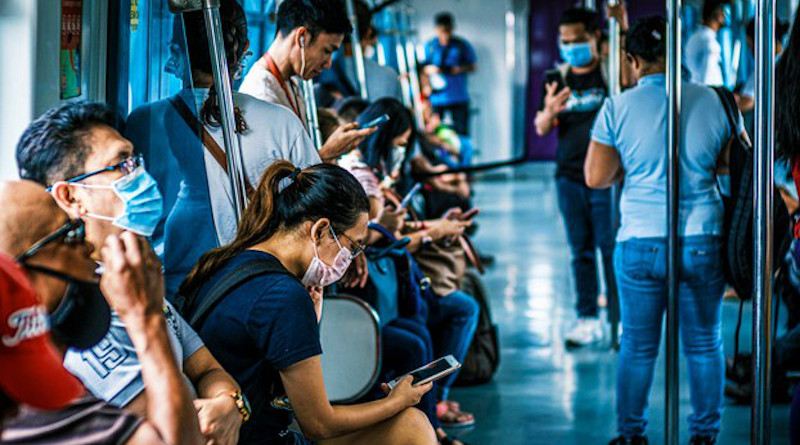Southeast Asian Nations Unleash Aggressive Moves To Control COVID-19
By BenarNews
By Tia Asmara, Ronna Nirmala, Pulack Ghatack, Pimuk Rakkanam and Muzliza Mustafa
Indonesia unveiled a U.S. $1.6 billion emergency stimulus plan on Friday to protect itself from the economic impact of the coronavirus pandemic that has killed thousands worldwide, as other Southeast Asian countries also took aggressive steps to control their soaring numbers of infections.
In neighboring Malaysia, the new government banned mass gatherings until May and acknowledged that the country’s tourism sector had been hit with losses of almost 3.4 billion ringgit (around $800 million) during the first two months of the viral outbreak.
“These won’t be the last measures,” Indonesian Finance Minister Sri Mulyani Indrawati told reporters as she announced tax breaks that economists believe would drastically impact Southeast Asia’s largest economy, pushing its budget deficit by 2.5 percent of its Gross Domestic Product (GDP), from an initial target of 1.78 percent.
As of Friday, Indonesia’s confirmed that cases of infections had doubled to 69, and three more people had died of COVID-19, bringing the number of nationwide fatalities from the disease to four.
“We have taken serious steps, but once again, I say, at the same time, we do not want to create panic, do not want to create anxiety,” Indonesian leader Joko “Jokowi” Widodo told reporters. “We all need to stay calm and work hard on this challenge.”
Jokowi issued his statement as Malaysia’s new prime minister said in a televised address that his government expected the outbreak to slash full-year GDP by up to 1.2 percent. In Kuala Lumpur, the health ministry said it had recorded 197 cases in Malaysia – a big spike from 39 on Thursday, with no reports of deaths.
“Based on current trends, this epidemic is expected to go on for a reasonably long period of time,” Prime Minister Muhyiddin Yassin said. “It will not end in the near future.”
To mitigate the pandemic’s impact, he said Malaysia would quickly implement a $4.7 billion stimulus package announced last month. Muhyiddin said religious and sports events and other mass gatherings would either be cancelled or postponed until after April as the government moved to control the epidemic.
The situation in other countries
As of Friday, the coronavirus has infected more than 132,000 people across the globe and killed almost 5,000, most of them in China, according to the World Health Organization (WHO).
On Friday, Thailand confirmed five more cases, bringing its tally of infections to 75, with one death reported.
The kingdom had earlier implemented a measure that would authorize disease control officials to issue quarantine orders or detain people suspected of carrying the virus.
But Thai Prime Minister Prayuth Chan-o-cha said it was “rather irrelevant to compare our efforts with those of other countries” in controlling the pandemic.
“It may not be right to jump to conclusion that the government is unable or failed to tackle problems before considering all perspectives of the issue,” Prayuth said in a statement Friday.
Without providing figures, Prayuth said the epidemic could also deliver a “significant impact” and lead to an economic slowdown. He urged Thais “not to panic” over the pandemic as he expressed confidence that the government “will get through this crisis.”
Thailand, whose robust tourism sector earned more than $60 billion from 39 million visitors last year, has temporarily suspended issuing visas-on-arrival to tourists from 19 countries and territories.
Last week, Bangkok designated six nations, including China, Italy and Iran, as “dangerous communicable disease areas” and urged people arriving from those areas to self-quarantine for 14 days.
In Bangladesh on Friday, health authorities said citizens returning home from abroad while carrying the coronavirus could face stiff penalties, including imprisonment of up to six months, for flouting quarantine regulations.
“The returnees [with confirmed coronavirus infections] from overseas, please remain in self quarantine,” Mirjady Sabrina Flora, director of the Institute of Epidemiology, Disease Control and Research, told a news conference in Dhaka, warning that violators may face charges under the nation’s law on epidemic diseases.
Flora made the statement days after the South Asian country of 165 million people confirmed its first three cases of the epidemic.
“We have asked the district officials to take action under the Communicable Disease Prevention, Control and Eradication Act 2018,” Abul Kalam Azad, chief of the Directorate General of Health Services, told BenarNews without elaborating.
Meanwhile, a wave of travel bans from Southeast Asia to the Middle East threatens to affect up to 12 million Filipinos working abroad, who remitted more than $35 billion last year – about 10 percent of the Philippines’ GDP – according to World Bank figures.
President Rodrigo Duterte on Thursday cancelled mass gatherings and ordered a sweeping lockdown of the capital, affecting 12 million people. In a televised announcement, he also ordered school closures for a month and prohibited domestic sea, air and land traffic in and out of Manila, starting Sunday.
Duterte, who has not experienced symptoms of the coronavirus, has opted to undergo tests in what officials had described as a precautionary move.
Manila has reported 52 coronavirus cases, with two fatalities as of Friday, according to WHO.
Jason Gutierrez in Manila contributed to this report.

